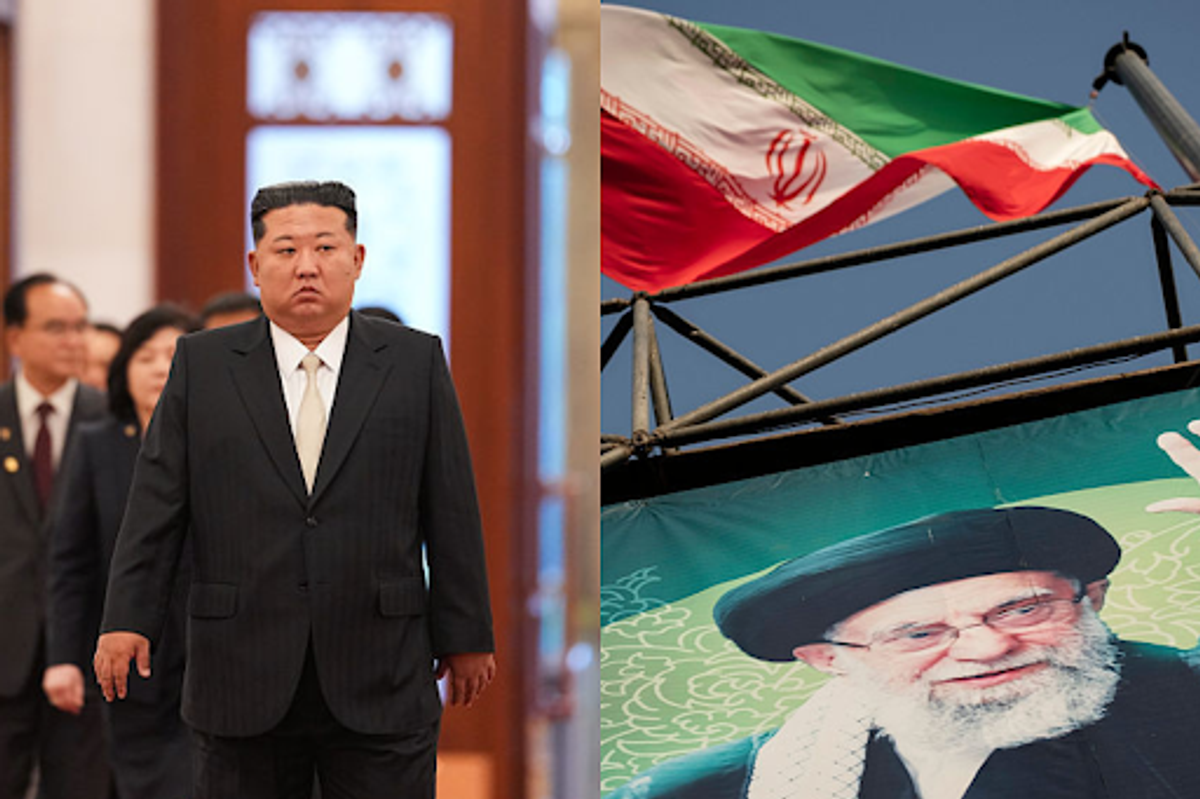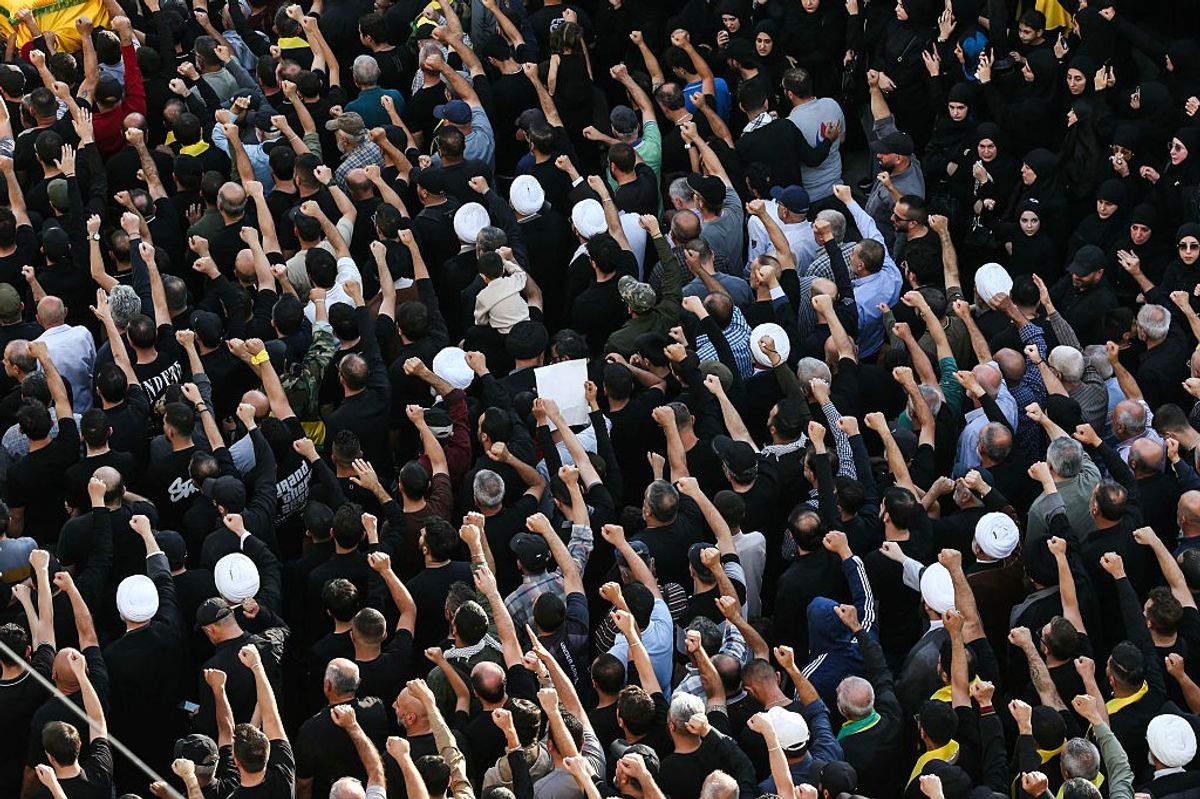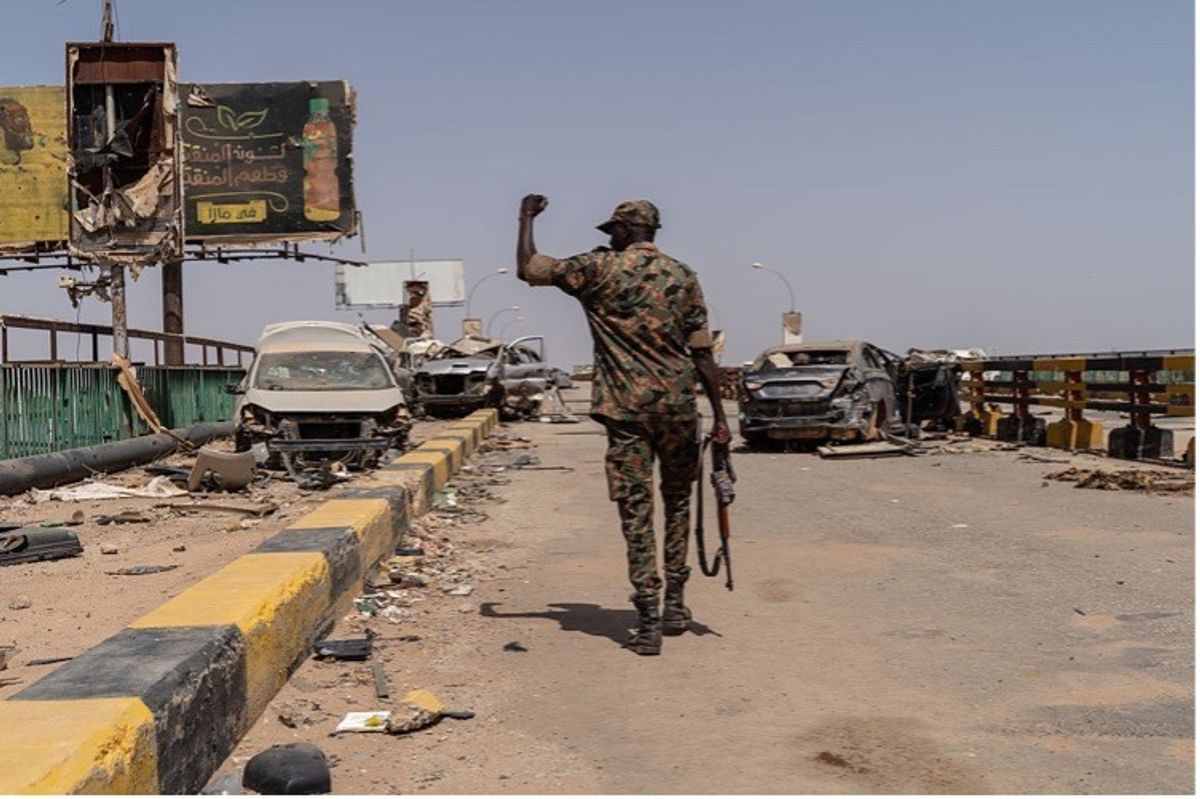EXPERT PERSPECTIVE – The White House rolled out a 20-point plan on Monday calling for a permanent truce in Israel's war against Hamas that calls for the release of hostages. President Trump is calling the plan the most significant effort yet to secure peace in the region.
Cipher Brief Expert General Jack Keane (Ret.), a trusted advisor to the president who declined multiple overtures to serve as U.S. Secretary of Defense during the first Trump administration, met recently in the region with Prime Minister Benjamin Netanyahu, President Isaac Herzog and Minister of Strategic Affairs Ron Dermer as well as senior IDF leaders to talk about what is needed for lasting peace and how to curb Iran's influence via proxies like Hamas.
After those meetings, we asked Gen. Keane for his assessment of the situation on the ground, whether he believes Israel is capable of sustaining wars on three separate fronts (Hamas in Gaza, Hezbollah in Lebanon and the Houthis in Yemen), and whether he believes Hamas will ever accept a deal that requires them to surrender power. Our conversation has been lightly edited for length.
THE INTERVIEW
Gen. Jack Keane (Ret.)
General Jack Keane (Ret.), a four-star general, retired after 37 years of military service culminating in his appointment as acting Chief of Staff and Vice Chief of Staff of the US Army. General Keane is president of GSI Consulting and serves as chairman of the Institute for the Study of War. In 2020, Gen. Keane was presented with the Presidential Medal of Freedom by President Donald Trump.
Kelly: As you’ve just returned from the Middle East where you engaged in a number of high-level meetings with senior Israeli leaders, what is your raw assessment of events on the ground?
Gen. Keane: There's a major paradigm shift strategically taking place in the Middle East as a result of Israel’s - supported by the United States - domination of Iran and its proxies. And it's hard to overstate the significance of it. The reality is that it's a sea change that's going to be felt for decades, and there is such huge opportunity here - once and for all - to stabilize the Middle East. But it’s an opportunity that requires follow-up with the Iranians to keep the pressure on economically and diplomatically. Iran is so much more vulnerable now after the defeat that Israel has handed to them.
Israel also needs to stay focused on the proxies - obviously Hamas, and hopefully, we will see a deal here pretty soon. Either they surrender or Israel will force them to give up power and get the hostages back as well.
Israel also must continue to push back on the Houthis. While we were there, there were three attacks in the vicinity where we were staying, during a nine-day trip. The Houthis are launching individual missiles or drones, but not in volleys. These are more - in military terms - harassment attacks, but Israel is pushing back hard on Houthis by destroying their valuable infrastructure.
Hezbollah has been completely decapitated, and every time Hezbollah tries to move into Southern Lebanon, Israel conducts airstrikes as they just absolutely refuse to let them rebuild in that area. Israel has conducted over a thousand airstrikes to make sure they don’t reconstitute in the South without much media coverage. When I met with Prime Minister Benjamin Netanyahu, I told him that I think there are two major lessons learned here for Israel. One is that you can never, ever again, permit Iran's proxies to build up capability on your border. And that is obviously significantly for Hamas, as well as Hezbollah.
And the second is that you've got to work yourself into a position where you're much more independent of the United States. I said, "You can't afford, going forward, to go through these political swings that we have now in national security and foreign policy in America where one Administration fully supports with everything you need and another Administration holds back what you need.
During the Cold War, the U.S. had a fairly consistent policy whether the Democrats or Republicans were in charge. For sure, some of the methods were changed from one administration to the next, but the objectives were pretty much the same: contain the Soviet Union.
Recently, we’ve gone through major swings. The previous administration - much more so than the American people realize - pulled the plug on a lot of the vital ammunition and weapons that Israel needed, and then they micromanaged how they conduct a war and this was being led by civilians out of the White House who had absolutely no competence in doing something like that, and Israel can't afford to go through another swing like that.
So, my advice is to get as close to being completely independent of the United States for weapons and ammunition but not independent of the United States in terms of geopolitical support or moral support, to be sure.
But the opportunities today are pretty significant and they're already taking place.
There is now work toward normalization of relations with Lebanon and Lebanon is talking about disarming Hezbollah. Who would've thought that something like that could have taken place just a couple of years ago?
Bashar al-Assad is gone in Syria and in Israel, Ron Dermer, the Minister of Strategic Affairs in Israel, who I spoke to at length, is working very hard to develop a security agreement with Syria and the new regime. They have their eyes wide open. They know that Ahmed Al-Sharaa is former al-Qaeda and that organization is still supporting him, but he's trying to consolidate all the different factions in Syria. And Israel doesn’t want any of those factions coming south and interfering with their security.
The Israel Defense Forces (IDF) took me into Syria to show me their defensive positions that they've established there. That makes some sense. I doubt if they will give any of that up in this security agreement, but the fact that there are serious negotiations going on is pretty significant.
In Gaza, hopefully we will get a deal here pretty soon, and that will certainly enable a lot of other things to happen once the fighting stops. But the Abraham Accords, despite the attack on the Qataris, despite the prolonged and protracted war in Gaza, the feedback that I got from Israeli leadership is that the Arabs are still interested in normalizing the relationship. They know that it's going to add to peace and stability in the region. It’s not necessarily easy, but it's something that has huge strategic potential for the future.
I think Turkey is a real challenge. President Recip Tayyip Erdogan had great influence on Al-Sharaa seizing power. I think he wants to control Syrian leadership and he's anti-Israel, he's pro-Hamas, he's Muslim Brotherhood, and he has been a thorn in the side of Democratic and Republican administrations for years, despite the fact that he's a member of NATO. I think when we're dealing with Erdogan, even though he's been there longer than we would like to see, we have to look beyond him and look at the strategic place that Turkey holds in the Middle East and in Europe. They're the second-largest military in Europe, after Russia. The largest military member of NATO in Europe, obviously the United States is more powerful than them. So, they have huge capability, and while Erdogan frustrates us quite a bit, I think we need to figure out a way to work with him in our interest and Israel's interest despite his anti-Israel attitude.
And as much as that may be an opportunity, it's probably more of a challenge. President Trump is cutting the deal with him in the memorandum of understanding to build small modular nuclear reactors and the large nuclear reactors in the future. Turkey has one that was built by Russia and the fact that we're trying to pull him away from Russia, that's a good thing and could create some balance. If we just shut him down and don't want to deal with him because we don't like his attitude on a number of things, he'll just turn to Russia and China and that doesn't make any sense, strategically.
My overall take on this, is that if we continue to stay engaged and really finish Iran’s ability to be a destabilizer in the region, then the potential for stability and growth in the region - in the way that everybody's been hoping for, is really on the horizon.
The Cipher Brief Threat Conference is happening October 19-22 in Sea Island, GA. The world's leading minds on national security from both the public and private sectors will be there. Will you? Apply for a seat at the table today.
Kelly: Prime Minister Netanyahu was just in New York at the United Nations saying that Israel must finish the job in Gaza. You mentioned an agreement on the table. Do you have anything that makes you think Hamas would agree to it?
Gen. Keane: I don't know. I have great skepticism. We have been here so many times, where the United States, Israel and the Qataris have said, "We're really close to a deal." And then at the last minute, Hamas finds some reason to reject it. Hamas' real issue is that they want to stay in control of Gaza. Israel does not want that to happen, the United States does not want that to happen, and usually they foreclose on not making the deal because they don't want to give up control. Hopefully this time they're willing to, and that control would turn over to some representation of the Palestinians and Arab authorities and would allow for some kind of a stabilization force. Prime Minister Netanyahu has said time and time again, "I don't want to occupy Gaza. That's not in Israel's interest.”
Kelly: Yeah. Let's switch for just a moment to Russia. There’s been a change in the relationship between President Trump and Russian President Vladimir Putin over the last several months. President Trump has shown his growing frustration with Putin's lack of interest in actually ending the war in Ukraine. Where do you see the path forward there?
Gen. Keane: Just as you say, it's been eight months, and the president has admitted that he thought this was going to be easier than how it has turned out because he had such a positive relationship with Putin. But Putin's strategic objectives are very clear. He wants to take control of Ukraine, put in place a stooge government and expand into Eastern Europe, and he's dead set on that. Nothing to date has convinced him to change those objectives. In other words, he believes continuing the war is in his national interest so that Moscow can achieve those objectives, and nothing we have done has dissuaded him from that. So, what the president has done, I think, is to be patient with him, despite the fact that Putin delays, obfuscates, tries to confuse, et cetera. The Alaska Summit was a pivotal moment. There is no doubt that Putin made an overture to President Trump that he was willing to meet with President Zelensky following the summit, not immediately, but in a short period of time and that he was also willing to have a three-party meeting to include President Trump. The very next day, Putin’s spokesperson said that there are no plans for a meeting between President Zelenskyy and President Putin, and if there were going to be plans, there would have to be some conditions established and negotiated before there would ever be a meeting such as that.
I think based on that, the president realized that Putin continues to lie consistently and especially during the last couple of months of the negotiations. And even post Alaska Summit, Putin has done what? He has militarily escalated the war, not a little bit, but quite significantly and his attacks are largely focused against the Ukrainian people with hundreds and hundreds of drones and ballistic missiles a night, raining down on them and hitting their energy infrastructure. He knows winter is coming and he wants the lights to be out and the heat to be off and for them to suffer.
And as of right now, there is somewhere in the neighborhood of 11,000 to 15,000 kidnapped Ukrainian children who are still in Russia's hands. We know this from multiple international sources and that, in of itself, is a war crime and really horrific. So, when you put all of that together; the delay tactics, the lies that he's been telling the President, and the military escalation, even as the president is trying to bring him to the negotiating table, he can’t be trusted.
Russia is weak economically, weak militarily, and they can be stopped. Not only can they be stopped, but they can be overtaken by the Ukrainian military. That is not a new thought process for the president. What's new now is that he is talking about it publicly. I can tell you for a fact that he's known for some time how weak Russia is economically and how weak they are militarily. Moscow is conducting a massive narrative that they're succeeding on offensive operations. “They're overwhelming the Ukrainians. It's just a matter of time. This is a war of attrition. The West, the United States and the Europeans, I can outlast them. They will eventually give in and we will win.” That has been his narrative. And now the president, I think, has made the decision to give up on Putin, and he's obviously talking to the public more about his perception of Putin, his perception of Russia, and the status that they have. That's step one. He hasn't changed any policy, but he's changed the narrative.
What remains to be seen is step two, and is the president going to continue what he said he would do, which is increase military and economic pressure on Russia? Military pressure could stop Russia cold from taking any more territory. And by the way, in the last two years, they've only increased the territory under their control by only 1% out of the 20% they control. And the president could also permit Ukraine to attack deep into Russia with increased long-range weapons and remove any restrictions on the use of those weapons. That would be significant military pressure.
We've been talking about economic pressure for weeks. Europeans must stop buying oil and gas from Russia. It’s shameful that they're still doing it, and very hypocritical. As the president says, "You are fueling Putin's war at the same time that you're supporting Ukraine. It makes no sense."
And then the United States needs to do the same in terms of sanctions and tariffs. That would be a part of a step two that makes the most sense. The sooner we get about that, the better. The president has said that in the past, and I believe that is what should be done. It's his decision, certainly, and we'll see what's going to happen next.
Kelly: As you mentioned, winter is coming, and Vladimir Putin knows how to take advantage of that time. How have you seen Russia expand military actions over the past few weeks?
Gen. Keane: We saw within the last week, Russia’s military activities escalating into violating Poland's airspace with war-like instruments. In this case, 19 drones penetrated Polish airspace and there was a smaller incursion in Romania and fighter jets violating Estonia's airspace as well. NATO must come to the conclusion that this activity is an Article 5 violation, and they have every right to shoot at those aircraft if they do it again. If they don't do that, if they wring their hands and continue to talk about it and push back rhetorically on Russia, what they'll see next is not a handful of drones but hundreds of drones and eventually a thousand drones that would absolutely overwhelm all of their air defense systems. These are acts of war, and they should be responded in kind. That doesn't mean that Poland's going to declare war on Russia, but I am suggesting they have every right to shoot at somebody who violates their airspace with warplanes. And that will get Putin's attention. Otherwise, if we don't do it and we just continue to use rhetoric, Putin will expand to other countries and increase the scale of the attack to weaken NATO and force the Europeans to focus more on their defense and less on Ukraine’s.
Putin is not reckless. He's a killer. He's a thug. He's ruthless, but he's not reckless. He's actually quite deliberate and methodical. We've been watching him for 25 years. Those of us who know him can almost call his plays because he's so predictable. Push back on him with strength and he will shut it down.
Updated to reflect White House release of the 20-point plan on Monday.
Are you Subscribed to The Cipher Brief’s Digital Channel on YouTube? There is no better place to get clear perspectives from deeply experienced national security experts.
Read more expert-driven national security insights, perspective and analysis in The Cipher Brief because National Security is Everyone’s Business.














